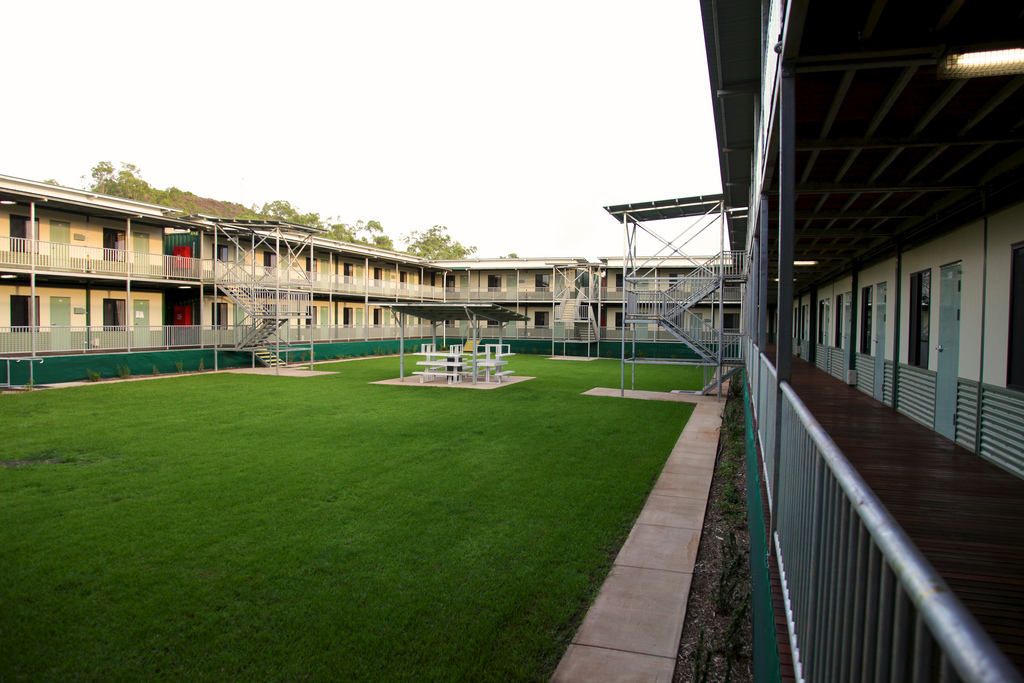Asylum Seekers Have Begun A Mass Hunger Strike In A Darwin Detention Centre
"We will not eat food because we have no hope left."

Australia’s mandatory detention of asylum seekers is in the headlines again for all the wrong reasons. Hundreds of asylum seekers being held in Manus Island detention centre have been on a hunger strike for more than a week, with detainees refusing food and water and sewing their lips together, and several attempting suicide by swallowing razor blades and laundry detergent. On Tuesday guards dressed in riot gear stormed one of the centre’s compounds, subduing protesting asylum seekers with what Immigration Minister Peter Dutton later described as “a degree of force”.
The Manus hunger strikes are not the only aspect of the government’s asylum-seeker policy attracting the wrong kind of attention. On Wednesday night former Manus Island centre guard Steve Kilburn appeared on the ABC’s 7.30, claiming the situation on Manus could again deteriorate into the kind of violence that saw the murder of 23-year-old Iranian asylum seeker Reza Berati in February last year. This morning, the Guardian reported that multiple journalists covering asylum-seeker policies have been reported to the Australian Federal Police by the Australian Customs and Border Protection Service, in an effort to uncover their sources.
Extraordinary: Immigration stories by @FarrellPF & me have been referred to the Australian police for investigation: http://t.co/t0A3HUVnDY
— Oliver Laughland (@oliverlaughland) January 21, 2015
Manus isn’t even the only place where hunger strikes are occurring; a 33-year-old Iranian man held in Darwin’s Wickham Point detention centre went on a 51-day hunger strike late last year. He was hospitalised and briefly went off his strike once his lawyers found an avenue to appeal his asylum rejection, but resumed his strike after losing hope. His lawyer reports that he has lost more than 30 kilograms and intends to see out his strike “till the end”.
Now he’s not alone. Junkee can reveal that up to eleven men in the Wickham Point facility allegedly began a hunger strike on Monday, partly to protest their detainment, and partly in solidarity with the 33-year-old.
Muhammad*, an Iranian man in his twenties who has been held in the centre for more than five months, says he and the other strikers are refusing food because they face a choice between being deported back to Iran and remaining in detention indefinitely.
“Me and some of the other guys in here, we go on hunger strike because we are prisoners here. We will not eat food because we have no hope left. They say to all of us, ‘you must go back to your own country of origin, or you will stay here forever’,” he says. He estimates ten other inmates are also on hunger strike.
“This is what happens when you treat people badly; they lose hope,” says Pamela Kerr, from the Asylum Seeker Resource Centre. “Hunger striking is the last thing they can do. [The government] has made it a crime for [detainees] to destroy property; it is a crime to break a window, to break a chair, to swear at a guard. So all they can do is harm themselves. That’s the awful thing.”
Muhammad came to Australia a few years ago, after coming to the Iranian regime’s attention for participating in widespread protests against the government; he fears persecution should he return to Iran. He was allowed into the community while his application was being processed, but was re-detained last year and taken back to Darwin, where he has been ever since.
“I was out and free for two years, and then they put me back in detention. I was working three jobs; I worked security on the weekends, I had students, I paid tax for a year. When they took me again I lost my job, I lost my house and my bond. I lost all my documents, which were really important. I had some furniture and now it’s gone; my friends had to throw it away, they couldn’t keep it for me. I spent two years building a life, and now it’s all gone,” Muhammad said.
“Everyone here is the same. We were all living lives in Australia, and now we are here.”
Muhammad has a network of people in the community working to overturn the ruling that rejected his application for a protection visa, all of whom he met during his years living and working as an Australian resident.
“I miss every second I spent in Australia. I cherish all the time I spent, and all the lovely people I got to meet,” he says. “I’m wasting my skills here. There’s nothing to do, every day is the same. It’s a torture of the mind.
We asked the Department of Immigration and Border Protection to confirm or deny Muhammad’s claims that a hunger strike has begun in the centre, and how many detainees are taking part. A spokesperson replied with the following:
“The Department ensures it meets its duty of care to all people in detention, including the provision of health care as necessary. The Department takes all advice from the detention service provider on medical issues. Australia is committed to meeting its obligations under the Convention and other relevant conventions including the 1951 Convention relating to the Status of Refugees as amended by its 1967 Protocol and the International Covenant on Civil and Political Rights. Mandatory detention, along with strong border security measures, ensures the integrity of Australia’s migration programmes. Unlawful non-citizens may be subject to detention if they have no entitlement to remain in Australia. Detention is administrative in nature and not for punitive purposes.”
The Department has not yet responded to requests for further clarification.
–
*Muhammad’s name has been changed.
Feature image via DIBP Images on a Flickr Creative Commons licence.